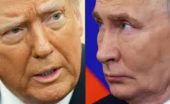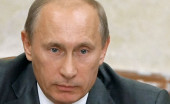Molly Minturn - My family is heartbroken to share that my father died in surgery on Monday, Feb. 10. It…
Ukraine 2013
Written by Diana Thebaud Nicholson // December 17, 2013 // Europe & EU, Russia // Comments Off on Ukraine 2013
The Guardian Ukraine
BBC World News Ukraine crisis
Reuters World News Russia
CIA World Factbook: Ukraine
The Fascinating History Behind Ukraine’s Toppled Lenin Statue
In the largest demonstrations since the country’s Orange Revolution, protesters tore down the symbol of Russian influence.
(The Atlantic) There are many ways to create iconic moments during protest movements, but perhaps none is as reliable—as fraught with symbolism—as toppling a statue.
The fight over the Lenin sculpture in Kiev mirrors a larger battle in Ukraine over monuments to the country’s communist past—one primarily waged between the traditionally nationalist west and pro-Russian east. In August, RIA Novosti noted that at least 12 Lenin statues had been defaced in Ukraine since 2009 as part of a “statue war” between communists and nationalists. In perhaps the most bizarre manifestation of this conflict, a promotional video for the Euro 2012 soccer championships in Kharkiv edited out a Lenin statue from a shot of the city’s main square to avoid showing “images of a commercial and political nature”Yanukovych’s Ukraine: Family Greed Fuels a National Aspiration
(Geopolitical Monitor) This article provides an overview of some of President Yanukovych’s key initiatives since popular disillusionment with Orange Revolution leaders gave him a slim majority in the presidential elections of February 2010, all of which have contributed to the current popular uprising and political standoff in Ukraine.
17 December
Putin outbids EU with $15-billion bailout offer to Ukraine
(Globe & Mail) Russian President Vladimir Putin has used his country’s economic might – cheap energy and billions in desperately needed cash – to yank neighbouring Ukraine back towards Moscow, infuriating the crowds protesting non-stop on the streets of Kiev and leaving a badly outplayed West with few obvious countermoves in the Cold War-style struggle over the fate of the former Soviet republic. (Reuters) Russian bailout wins Ukraine economic respite but deepens political rift — By grasping the lifeline thrown by Russian leader Vladimir Putin, Yanukovich reignited demands for his resignation by opponents at home already enraged by his decision to walk away from a trade and political deal with the European Union.
EU says door remains open to Ukraine as unity cracks
15 December
Ukraine: tale of two nations for country locked in struggle over whether to face east or west
President Viktor Yanukovych’s refusal to sign an agreement establishing closer cooperation with the EU has resurrected deep tensions about the soul of Ukraine
(The Guardian) Ukraine is often described as a divided country, but the scene in central Kiev this weekend provides an unusually striking picture of the split.
The core of the anti-government protest movement has come from western Ukraine, a region where Ukrainian nationalism is rife and people consider themselves already part of Europe. Unlike eastern Ukraine, the western area was not brought under Soviet control until the second world war, and distrust of Russia remains strong. … For their part, the eastern Ukrainians see the west as naive and lazy, out on the streets protesting while the workers of the east toil hard in coal mines and metal plants to keep the economy going.
11 December
Yanukovych Must Go
Ukrainians Will Protest as Long as His Corrupt Regime Exists
(Foreign Affairs) Mykola Azarov, Ukraine’s prime minister, called the peaceful demonstrators in Kiev “Nazis” and compared the statue’s toppling to the Taliban’s destruction of the giant Buddhas of Bamiyan in Afghanistan in 2001. European Commission President José Manuel Barroso, meanwhile, praised the “young people in Ukraine’s streets” for “writing a new history of Europe.” The demonstrators’ slogan (“Ukraine is Europe!”) signifies much more than a desire to join the EU. For them, as for most Ukrainians, Europe is a symbol of democracy, national dignity, human rights, and freedom — everything they believe, correctly, the Yanukovych regime opposes.
8 December
Ukraine protesters fell Lenin statue in challenge to Yanukovich
(Reuters) – Anti-government protesters toppled a statue of Soviet state founder Vladimir Lenin in Ukraine’s capital and attacked it with hammers on Sunday in a symbolic challenge to President Viktor Yanukovich and his plans for closer ties with Russia. The gesture rejecting Moscow’s historic influence over Ukraine came after opposition leaders told hundreds of thousands of demonstrators on Kiev’s Independence Square to keep up pressure on Yanukovich to sack his government.
1 December
Why Ukraine Matters
(Forbes) The past week has seen massive protests in Ukraine in response to President Viktor Yanukovich’s bungling of an EU trade pact. It is one of those seemingly obscure international events that are easy to miss, especially in the middle of the holiday season. Yet the events in Ukraine matter and not just because what they bode for the future of Europe and an increasingly desperate Vladimir Putin, but because this is a story that will continue to resonate in the years to come. Ukraine, by most standards, should be an economic juggernaut. It has ample natural resources, a highly educated, diligent workforce and is situated in an advantageous geographical position. So the story of Ukraine shows just how a country with everything going for it can suffer so much, just as it will hopefully show how a troubled society can finally find its way forward. … what really matters, more than economic data or assurances from officials, is whether there is a solid, definable commitment to adopt universal standards. Corruption, after all, is not culture, but its absence. As digital technology renders economic borders meaningless, local norms are an illusion and a dangerous one at that. So keep an eye on how the events unfold in Ukraine, because it will be a bellwether for the years to come. The question being debated really isn’t about “spheres of influence” or geopolitical chessboards, but whether we truly live in a global marketplace of ideas that transcends the selfish presumptions of an earlier age.
Pro-EU protesters chase police from central Kiev Chants of ‘revolution’ resound across Independence Square in reaction to President Yanukovych’s refusal to sign EU free trade deal. Kiev Protests Draw Over 300,000 People To March Against Regime
30 November
Ukraine’s Yanukovich vetoes EU push to save trade deal
(Reuters) – Ukrainian President Viktor Yanukovich vetoed last-minute attempts by the European Union to rescue a trade deal that could have been signed at a summit on Friday and would have signaled a historic shift away from Russia, EU diplomats said. Under pressure from Moscow, Yanukovich abandoned plans last week to sign the agreement, preferring closer ties with Ukraine’s former Soviet master and dealing a blow to EU efforts to build closer relations with its eastern neighbors.
25 November
Yulia Tymoshenko declares hunger strike over Ukraine’s EU snub
(The Guardian) Government decided last week to shelve association and trade deal with EU and forge closer ties with Russia instead.
EU ready for bilateral talks with Russia over Ukrainian trade deal – official
The European Union is ready to discuss issues that are of concern to “Ukraine’s neighbors” in the format of bilateral talks, a spokesman for Stefan Fule, EU’s Commissioner for Enlargement and Neighbourhood Policy, has said. Speaking to the Ukrainian TV channel 1+1, Fule’s spokesman, Peter Stano, said the EU was willing to discuss the complications surrounding Kiev’s suspended decision to join the European trade zone. Stano then stressed that Kiev’s actual signing of the EU-Ukrainian agreement was an issue to be discussed only between the two sides of the deal. Earlier this week, Ukraine’s proposal for holding trilateral talks with Russia and the EU on the controversial deal was thwarted by Lithuania, currently presiding at the European Council. Fule on Saturday claimed that the EU has given a “clear signal” to Ukraine that there will be some financial aid for the Ukrainian economy, should Kiev sign the agreement and enter the EU trade zone. However, the Ukrainian Prime Minister Nikolay Azarov on Sunday reiterated that, despite repeated requests for help from the EU, only a “word-of-mouth promise” of just 1 billion euro aid within the next 7 years has come from the European block.
Ukraine Opposition Seeks to Keep Pressure on Yanukovych
(Bloomberg) Tensions have been rising since the government halted preparations for a free-trade agreement with the EU on Nov. 21, saying it wanted to focus on reviving trade with Russia and other ex-Soviet states. Protesters have since poured into Kiev’s Independence Square, the focal point of Orange Revolution protests that overturned a Yanukovych presidential election victory the opposition said was marred by corruption and fraud. … The opposition is seeking an extraordinary meeting of parliament next week to adopt laws necessary to sign the EU pact and will push for the assembly’s dissolution if they fail to pass, Tymoshenko ally Oleksandr Turchynov said, reading a resolution to protesters. The parties lack a majority in the chamber. He said protests would carry on for as long as needed, as demonstrators erected several dozen tents as part of the protest.
23 November
Ukraine had no option – drop EU for Russia or be crushed
(Gulf News) Collapse of talks a blow to European
balance of power as Kremlin sanctions
trump historic trade deal Ukraine’s Prime Minister, Mykola Azarov, told the country’s parliament that it has been forced to cancel its trade and pre-accession deal with the EU because Russian sanctions are strangling the economy, “pushing Ukraine to the brink of a huge social crisis”. The accord was due to be signed at the EU’s Vilnius summit this week. The volte-face stunned EU officials, torn between fury over Ukraine’s conduct and deep alarm over what has happened. … Kiev said it acted in the “national security interest”. It has emerged that President Viktor Yanukovych flew secretly to Moscow few weeks ago to see Putin. The pro-Kremlin outlet Russia Today said Ukraine had wisely stepped back from the EU “horror show” and accepted the real worth of Russian ties rather than hot air from Brussels. Ukraine had dodged a “death spiral” by protecting its eastern trade flows. Putin has been tightening the screws for months, blocking shipments of goods and targeting heavy industry in the eastern region that depends on the Russian market.
31 October
Ukraine’s Prisoner’s Dilemma
(Project Syndicate) The European Union’s most important decision this fall will be whether to sign an Association Agreement with Ukraine at the EU summit in Vilnius on November 28-29. The issue will turn on whether Ukraine’s President, Viktor Yanukovych, fulfills one vital condition: a full pardon for political prisoner and former Prime Minister Yulia Tymoshenko. The Association Agreement, which runs to some 1,200 pages, would remove almost all EU tariffs on Ukrainian goods, boosting the country’s long-term GDP by an estimated 12%. It would also establish a political, economic, and legal reform plan for the country, supported by roughly 60 state agencies in EU member countries. Although the Association Agreement does not lead automatically to EU membership, it is an important step in that direction. Under the Treaty of Rome, Ukraine, as a European country, qualifies as a potential EU member. But it would have to fulfill the EU’s “Copenhagen criteria,” established in 1993, which sets out the basic entry standards.




